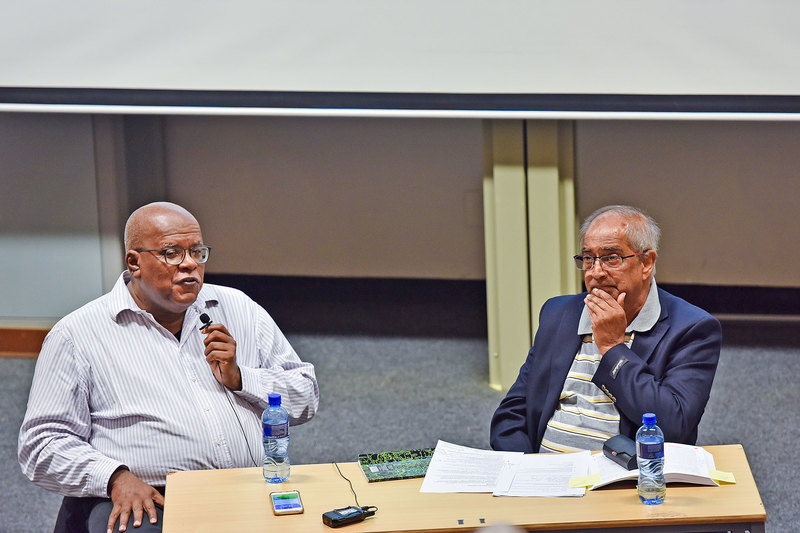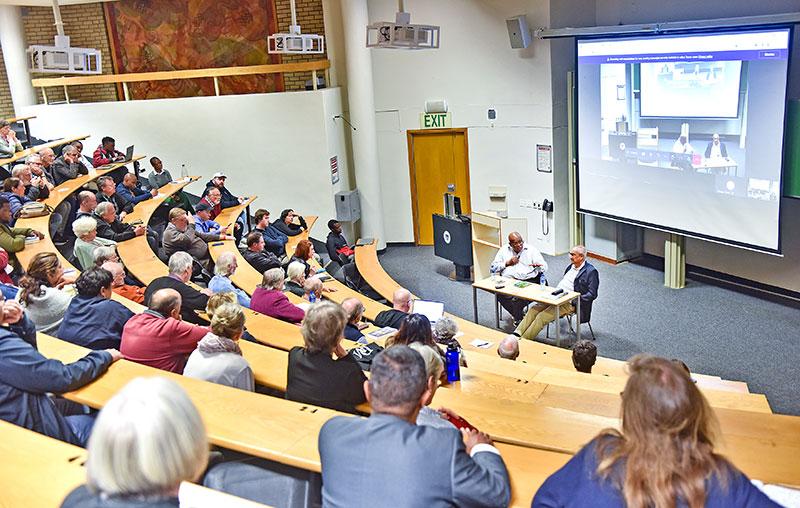‘A growing swamp’ – Dysfunction and corruption threaten SA’s universities
26 May 2023 | Story Helen Swingler. Photos Lerato Maduna. Read time 10 min.
The politicisation of top governance in South African universities is an entrée to corruption, and if left unchecked, the “growing swamp” will destroy higher education and snuff out the lamp of learning for generations to come, said Distinguished Professor Jonathan Jansen.
Jansen is Distinguished Professor of Education at Stellenbosch University and the president of the Academy of Science of South Africa. His research is concerned with the politics of knowledge in schools and universities.
He was speaking at a University of Cape Town (UCT) Summer School Extension Series event on 3 May, in conversation with UCT’s Anwar Mall.
Mall is a medical biochemist and an Emeritus Professor of Surgical Research in the Faculty of Health Sciences. His extensive student and academic support activities were in the faculty and the residences at UCT, where he was a warden for 27 years. He was also acting deputy vice-chancellor for Student Affairs and Transformation at UCT from 2015 to 2016.
Bleed universities dry
The discussion, “Why universities are not exempt from corruption”, explored themes from Jansen’s recent hard-hitting book, Corrupted: A study of chronic dysfunction in South African universities.
“It reads like a crime novel.”
An alarmingly high number of the country’s 26 higher education institutions are already at risk, Jansen said. The example of politically motivated assassinations and attempts on the lives of vice-chancellors and senior staff at institutions such as the University of Fort Hare had illuminated the reality of criminal syndicates operating with impunity.
Governance bodies had been infiltrated by individuals’ intent only on bleeding these institutions dry, Jansen said.

In his introductory remarks, Mall said that the book was one of the most uncomfortable reads of his life.
“It read like a crime novel.”
His first question to Jansen flagged a larger concern: “Have we lost the love and value of learning in this country?”
He added: “I always told my students that life of the mind is a rich life. At university we have an opportunity to develop and enrich the mind. And that will stay with us forever … If that’s what the university is for, why would staff and students engage in corruption and violent activities like burning libraries or artworks?”
Jansen said that while the threats to higher education were considerable, he doesn’t believe “the game is over with respect to a love of learning”.
“UCT [for example] is lucky to have those values in place and has some of the world’s leading scholars, some of the most productive laboratories for science and medicine with great thinkers in philosophy, literature and so on. But there’s a worldwide problem of reducing teaching and learning to ‘best outcomes’.”
Neoliberalism and production units
Universities across the world are in constant struggle with what social scientists call the neoliberal university, he said.
“Get as many students across the line as possible, turn research into production units and ensure we optimise the publication subsidy of the university.”
This has its own pitfalls, he said. In the case of one university, which produces an unusually high number of published journal papers (the journals are not reputable, and neither is the quality of the research, Jansen said), the target is to milk the government’s publications subsidy.
“You must then expect some of that [unethical behaviour] to rub off on to the students.”
“You must then expect some of that [unethical behaviour] to rub off on to the students, he added.
This is a betrayal of the university’s responsibilities.
“We must train the next generation of professors so that they can step into a classroom and engage students to come to love the intellectual property. Because if you don’t, the swamp is going to grow.”
In this endeavour, universities need strong academic leaders at the helm, with a clear vision of their task, Jansen said.
“Take Fort Hare, where vice-chancellor Professor Sakhela Buhlungu understands the value of learning.
“We forgot what universities are called for … It’s a particular kind of institution set up for an enduring purpose.
“As I said to a group of vice-chancellors I met with recently, ‘How many of you have stood up at orientation or graduation and told the students what a university is for?’ South Africans equate a degree with getting a job.”
Therein lies a problem, Jansen noted. The goal of higher education is to provide students with a skill set, not prepare them for a specific job, except for the narrowest of professions.
The cupboard is bare
But when it comes to good leadership, the cupboard is bare, Jansen noted. The crisis has impacted on councils, senates and other university governance bodies. And if avoided, problems “at the top” create havoc within the institution.
“A vice-chancellor is only as good as their second tier,” Jansen said. “And we’re dealing with a set of very serious issues about where the next generation of leaders will come from.”
Mall noted the importance of appointing leaders with the requisite in-depth experience to manage their specific portfolios; those who “truly understand the terrain”.
Jansen said that while universities train emerging professors, introducing new, young blood to the academic corps for continuity, similar advancement programmes should be in place for university leadership roles.
“I always thought that UCT had a problem with liberal guilt. They didn’t know how to deal with black students or staff – or black anything.”
“There does seem to be a lack of imagination about it, yet we see the crisis. There are many young people with excellent academic achievements and leadership capability. But there isn’t that kind of thinking. And so almost every appointment gets contested at a political level only.”
Mall shared his experiences as a professor who was also warden of Liesbeeck Gardens, a large residence for predominantly black students. It had been a tough job, he said, with students challenging the university’s ‘colonial’ laws, regulations and rules.
Around the country, student protesters were allowed to break university rules and break the law, assault members of the university community, vandalise facilities and, in UCT’s case at the height of student protests in 2016, petrol bomb the vice-chancellor’s office.
“Have we failed?” Mall asked Jansen.
Jansen’s reply was pithy. “I always thought that UCT had a problem with liberal guilt. They didn’t know how to deal with black students or staff – or black anything – because of the enormous sense of guilt. That guilt was not displaced. But I don’t think it was managed in a constructive way.”
Part of an arsenal
Student protests aren’t disconnected to the question of functionality, said Jansen.
“And that’s a very important issue. It may be a very small percentage of students, but we give in. In dysfunctional universities, protest is part of the arsenal used by corrupt people to keep the university unstable; the more you break down the rules, the more you can break the rules.”
“[But] if you don’t deal with assault … the more you back off, the more you put the university at risk. This puts the university in a very difficult place because the university isn’t for the students of your age or mine,” Jansen said. “The university is for our grandchildren.”
The challenge in leadership is to keep the balance between encouraging protest as a part of the vital system of democracy while insisting on minimum rules for protesting, beyond which students begin to threaten the idea of the university, Jansen said.
“The people who are being arrested have no credibility, no record of success. What are they doing on councils?”
“But by and large in corrupt universities, the activists realise that the power lies in getting your man or woman onto council to connect the internal corrupt people with the external corrupt people. And influencing the way funds are disbursed for infrastructure grants and tender processes.
“The big issue is: How did those institutions of governance become compromised to serve purposes other than what they were originally established for? If you look at Fort Hare … the people who are being arrested have no credibility, no record of success. What are they doing on councils?”
Eye on the ball
However, it is very hard to depoliticise anything in South Africa, he noted. This is problematic for academic appointments.
“The main purpose of academic appointments can’t be politics. The primary purpose is what skill set do you bring to the running of the university? You’re looking at a R90 billion enterprise in this country and you need people who know how to manage universities, period.
“If we don’t understand the dynamics of corruption, such as at Fort Hare, you will lose your university. These are people desperate for education for their children. We simply can’t fail our people down the line.”
Another looming question concerning corruption and dysfunction at universities is the role of the National Department of Higher Education and Training.
“Where have they been?” Jansen asked. “They’re not there to run universities, they are there to ensure governance controls are in place at a national level – for all 26 higher education institutions.”
How had they allowed the University of Johannesburg to amass R310 million in unallocated National Student Financial Aid Scheme (NSFAS) funds from 2016 to 2021? And, according to another media report, wrongfully award some R5 billion in NSFAS funding to 40 000 students who did not qualify for it?
“Why have they still not resolved their [NFAS] issues of efficiency and equity?”
 This work is licensed under a Creative Commons Attribution-NoDerivatives 4.0 International License.
This work is licensed under a Creative Commons Attribution-NoDerivatives 4.0 International License.
Please view the republishing articles page for more information.










